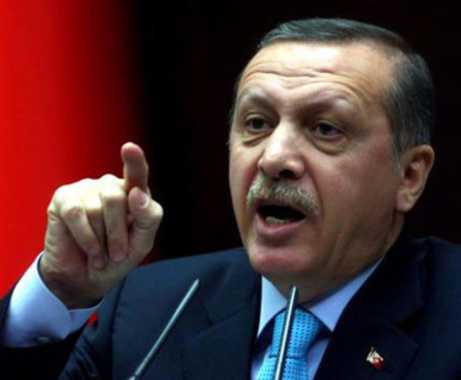The problem with Islamist Turkey’s ‘zero problems’ policy
Special to WorldTribune.com
By Gerald Robbins
The culprit in last week’s suicide bombing at the U.S. Embassy in Ankara was not, as expected, an Islamic terror group bent on attacking American interests. Rather, a Marxist organization known as the Revolutionary People’s Liberation Party Front claimed responsibility.
The group’s communiqué explained the assault as a response to “imperialist ventures” in Egypt, Libya and Syria. The growing consensus is the bombing was a warning to Turkey’s Middle East ambitions.
Turkish police secure the area after an explosion at the security entrance at the U.S. Embassy in Ankara on Feb. 1. /EPA/BGNES
Nowadays it’s popular to see Turkey as a necessary regional overseer, a strategically important nation bridging Christian and Muslim environments. Its location, Islamic legacy and decades of Western political adaptation seemingly make it a natural interlocutor that can correctly discern how to deal with the Arab Spring. Yet what has transpired indicates otherwise.
Ankara’s once solidly pro-Western orientation is now offset by its growing involvement in Middle Eastern affairs. This is primarily due to the Islamist ideology of the governing Justice and Development Party (AKP). Economic overtures towards the Gulf region and neighboring Arab states, coupled with a belief in Muslim solidarity (a retort to the European Union’s lukewarm reaction to Turkish membership) underscore what has transpired.
Turkey’s shift isn’t an ad hoc retort to the EU’s recalcitrance nor the post-Cold War’s geopolitical vacuum however. Since the AKP came to power nearly a decade ago, Turkish foreign policy has followed what’s been called a “zero problems” doctrine.
Conceived by Turkey’s Foreign Minister, Ahmet Davutoglu, “zero problems” essentially establishes friendly, non-confrontational relations with surrounding neighbors while overlooking their objectionable aspects. Ankara’s rationale assumes that acting as an understanding, non-judgmental fellow Muslim can eventually enlighten wayward regimes. It’s an endeavor which theoretically provides Turkey with a sense of regional prominence. It also complements the Obama administration’s “lead from behind” philosophy, signifying Ankara is better tasked for promoting democratic values in the Muslim world than Washington.
However Turkey’s outreach towards its Arab neighbors has been disappointing. Ankara believed there was a critical gap in the Arab Spring’s regional ferment that it could capably fill. Initially pro-Turkish sentiment was on display. Arab demonstrators were televised holding placards of Turkey’s fiery Prime Minister, Recep Tayyip Erdogan, whom commentators compared to a latter day version of Gamal Abdel Nasser.
Impromptu polls throughout the Muslim world commonly found Turkey to be the most admired if not inspiring society. The idea that a Turkish-led “neo-Ottoman” commonwealth would result from these revolutions was advocated throughout academic and think tank institutions.
The events afflicting Syria noticeably altered matters.
The Syrian Spring reflects how the region’s once hopeful promise quickly devolved into disappointment and uncertainty. Almost two years of civil war have killed over 60,000 people.
Considering that Turkey’s longest border is with Syria, the ongoing struggle to unseat the Assad regime unnerves Ankara. An estimated 200,000 Syrians fleeing the bloodshed currently reside in Turkish refugee camps, straining resources and goodwill. The fighting has occasionally spilled over to Turkey’s side of the border, inflicting sometimes fatal casualties. Coping with these hardships is part of Ankara’s dilemma, since it’s uncertain who exactly controls the Syria’s frontier.
Damascus relinquished its border presence several months ago to concentrate its forces around the capital and major cities. A medley of anti-Assad factions with varying agendas and ideologies have filled the void. The Syrian border land is also primarily inhabited by the Kurds.
In light of the fact that Turkey’s quarter century insurrection with its own Kurdish population has cost over 35,000 lives, Ankara’s neo-Ottoman expectations have been chastened by next-door anxieties.
Syria is the cornerstone of Turkey’s Eastwards outreach. Prior to the Arab Spring, civilizing Bashar Assad’s errant ways was the marketing tool the Erdogan government used to convince Western officialdom of its vital role as a sociopolitical go-between. Defanging Damascus would also greatly benefit Turkey’s campaign to become a full member of the European Union.
Instead of Washington-led belligerence, Ankara endeavored to gently goad Syria with trade and treaties. Prime Minister Erdogan lauded his “brotherly” relations with President Assad, noting a shared Ottoman legacy as the key to success.
Evoking this common history is a flawed concept. Several centuries of Ottoman rule over Syria and other Arab domains was far from nostalgic. Governance was essentially harsh if not inefficient and rife with corruption. Save for a shared religion, noticeable variances appear. There is a colonizer versus colonized perspective to consider. The Ottomans were foreign rulers within the Arab homelands, a history that has more in common with British, French and Dutch annals than fellow Muslims. Even the idea of religious solidarity is suspect. Turkey’s early Twentieth Century decision to cast its lot with Western secularism gave it a suspect reputation among Muslim brethren. Arab protestors admire Erdogan’s character, but it’s a different system and historical legacy from which he hails.
As Syria continues bleeding, the perception of being a regional savior decreases. Détente with Damascus has become a diplomatic embarrassment for the Turks, blemishing credibility.
“Zero problems” has metastasized into multiple problems, ranging from diplomatic overreach to festering crossborder tensions that can quickly turn viral. Unfortunately the U.S. Embassy bombing in Ankara might be a harbinger of things to come.




